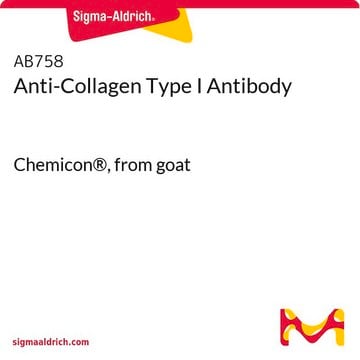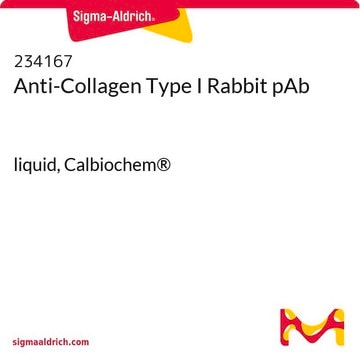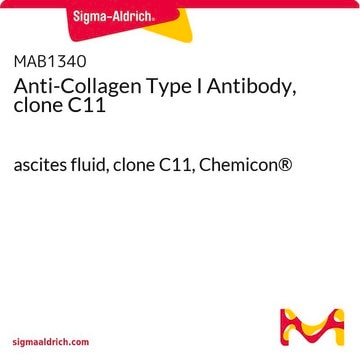Fontos dokumentumok
SAB4200678
Anti-Collagen Type I antibody, Mouse monoclonal
clone COL-1, purified from hybridoma cell culture
Szinonimák:
Monoclonal Anti-Collagen Type I antibody produced in mouse, OI4, alpha 1, alpha 2, collagen, type I
About This Item
ELISA
IHC
dot blot: suitable
immunoblotting: 1-2 μg/mL using recombinant human collagen, expressed in Nicotiana tabacum
immunohistochemistry: 3.5-7 μg/mL using frozen sections of human tonsil, human tongue or pig tongue
Javasolt termékek
biológiai forrás
mouse
Minőségi szint
antitest forma
purified immunoglobulin
antitest terméktípus
primary antibodies
klón
COL-1, monoclonal
Forma
buffered aqueous solution
faj reaktivitás
pig, rat, human, deer, bovine
koncentráció
~1 mg/mL
technika/technikák
ELISA: suitable
dot blot: suitable
immunoblotting: 1-2 μg/mL using recombinant human collagen, expressed in Nicotiana tabacum
immunohistochemistry: 3.5-7 μg/mL using frozen sections of human tonsil, human tongue or pig tongue
izotípus
IgG1
kiszállítva
dry ice
tárolási hőmérséklet
−20°C
célzott transzláció utáni módosítás
unmodified
Géninformáció
human ... COL1A1(1277)
Általános leírás
Immunogén
Alkalmazás
Biokémiai/fiziológiai hatások
Fizikai forma
Jogi nyilatkozat
Nem találja a megfelelő terméket?
Próbálja ki a Termékválasztó eszköz. eszközt
Tárolási osztály kódja
12 - Non Combustible Liquids
WGK
WGK 1
Lobbanási pont (F)
Not applicable
Lobbanási pont (C)
Not applicable
Válasszon a legfrissebb verziók közül:
Analitikai tanúsítványok (COA)
Nem találja a megfelelő verziót?
Ha egy adott verzióra van szüksége, a tétel- vagy cikkszám alapján rákereshet egy adott tanúsítványra.
Már rendelkezik ezzel a termékkel?
Az Ön által nemrégiben megvásárolt termékekre vonatkozó dokumentumokat a Dokumentumtárban találja.
Az ügyfelek ezeket is megtekintették
Tudóscsoportunk valamennyi kutatási területen rendelkezik tapasztalattal, beleértve az élettudományt, az anyagtudományt, a kémiai szintézist, a kromatográfiát, az analitikát és még sok más területet.
Lépjen kapcsolatba a szaktanácsadással













